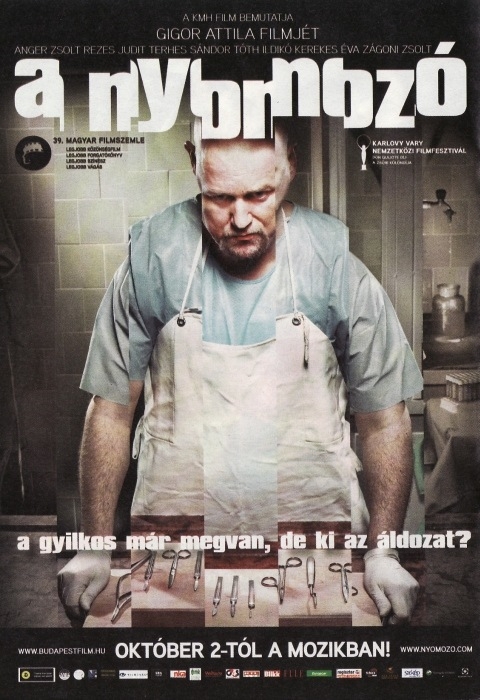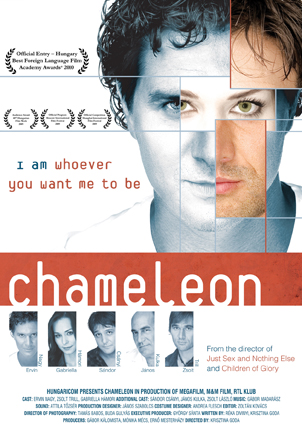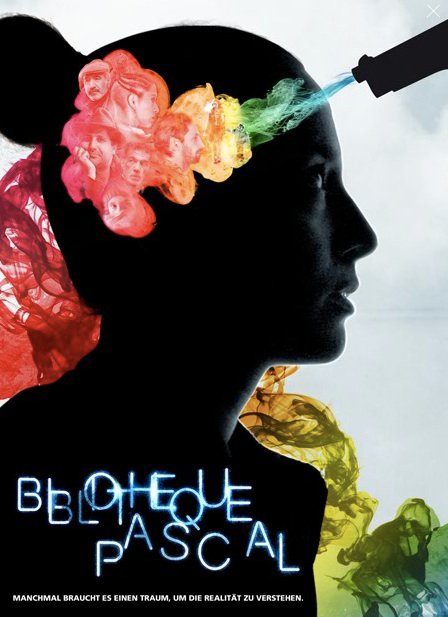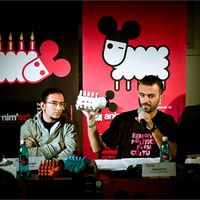Search in Progress… Keywords: Hungary, Films, Exceptional – Time interval: 2008-2010

Even though Hungarian cinema in general is not quite thriving nowadays, over the past decade each year one or more exceptional feature films were made by the young generation of directors which either amaze, shock or thrill audiences both in and outside of Hungary. Without attempting to enlist all remarkable Hungarian feature films made between 2008 and 2010, I will try to highlight some of the best movies which have gained international acclaim in Europe or throughout the world, are distinguished as best films of the last years in Hungary, or are just simply memorable. Special focus will be granted to Szabolcs Hajdu’s Bibliotheque Pascal, some of Kornél Mundruczó’s thoughts which shape his vision on filmmaking and to Károly Ujj-Mészáros’s film project: Liza, the Fox-Fairy.
How would you start searching for information or content about Hungarian films? It isn’t quite as convenient as in the case of one its neighbouring country, where you just type in “Romanian New Wave” and the search engine immediately “knows” exactly what you are looking for. The diversity of Hungarian films does not allow the labelling of this country’s films – although there seems to be a tendency of tagging Hungarian art films as overly pessimistic, dark or even perverted –, however, perhaps the keyword “searching” would be most fit to characterize both the means and the content of the majority of these movies.
Searching for means on one hand refers to finding the necessary funds for the films, since the recent political changes reshape the film funding system (more about this can be read at http://magyar.film.hu/filminhungary/news/), a major motion picture foundation has blocked funding and even the Hungarian Film Week usually organized in February, is most likely to be delayed, so this has surrounded all film-related projects with a shroud of uncertainty. On the other hand the search for means refers to taking interest in various genres in case of mainstream films. This has lead to the born of several genre films, mostly romantic comedies, but also thrillers, musicals or the mixture of these. In the artistic film department the exploration of different film styles resulted in making of notable experimental films (Ferenc Török’s Koccanás – TV film) or films based on improvisation (I am not your friend).
Search by name
Recent and upcoming films by renown Hungarian directors as Béla Tarr, Miklós Jancsó, István Szabó or Károly Makk of the older generation are much expected and appreciated both in Hungary and at international film festivals, while many talented young directors have presented exceptional accomplishments through intense work during only a decade: György Pálfi (Hukkle, Taxidermia, I am not your friend), Szabolcs Hajdu (Tamara, White Palms, Bibliotheque Pascal), Kornél Mundruczó (Johanna, Delta, Tender Son – The Frankenstein Project), Benedek Fliegauf (Forest, Dealer, Milky Way).
Search for the victim
We have the killer, but who is the victim? This is the tagline on the poster of The Investigator, Attila Gigor’s (Galambos) debut feature film which was the great surprise of 2008.
[caption id="attachment_1058" align="alignright" width="307" caption="Poster of The Investigator"]
Often referred to as one of the best Hungarian films of the year, this low-budget thriller follows the story of Mr. Malkáv (Zsolt Anger), a man of few words who works at a morgue. The protagonist kills an unknown man to receive money for his mother’s surgery, but he later finds out that the man he had just killed is pretty much related to him, so he starts investigating the background of the victim and tries to discover the identity of the one ordering the murder. Anger’s brilliant acting was also acclaimed, in addition to the several prizes the film has won. The interesting plot of this Swedish-Irish-Hungarian co-production is enhanced with black humour pouring out of each possible source.
The victims of Krisztina Goda’s Chameleon are rich and naïve young women who fall into a swindler’s net and end up both broke and heart-broken.
This clever, well-made and entertaining movie stands out among the many Hungarian romantic comedies which give the impression of much struggle in imitating the Hollywood textures. This mainstream film manages to keep up the fast paced natural flow of the plot, witty dialogues, humour, elements of drama and thriller. Aside from winning several prizes and the audience award at the Hungarian Film Week, the lady director’s movie was also the Hungarian submission for the best foreign-language film for the Academy Awards in 2009.
Search keyword: festival films
Since 2008 Kornél Mundruczó has already represented Hungary twice in the competition section of the Cannes Film Festival. In 2008 Delta won the FIPRESCI prize, and last year his new movie, Tender Son – The Frankenstein Project was also screened at the competition selection of the festival. All of Mundruczó’s feature films were screened at the 12th Bratislava International Film Festival and those interested could also participate at the discussion with the director.
[caption id="attachment_1061" align="alignright" width="302" caption="Poster of Chameleon"]
 [/caption]
[/caption]When asked about his films, the Hungarian director pointed out that without festival-participation the kind of filmmaking he does, would not be necessary. Regarding his relationship with the producer, Mundruczó noted that he has an exceptional producer (Viktória Petrányi), they work closely together and maybe without her, he wouldn’t even make any films. He does not have deep concepts about what he should do, but rather focuses on two things: to create unsolvable situations and to present these through marginal characters, because characters outside of the circle tell a lot more about the ones inside than the other way around. In filmmaking he tries not to follow the trend and likes the logic of creating perturbation in the system. Mundruczó believes that specific issues are too common and temporary, so it is a challenge for him to remove all concrete elements from of his films and create a timeless material.
[caption id="attachment_1064" align="alignright" width="448" caption="Mundruczó Kornél (right) with the moderator, Paolo Bertolin (left). Photo by Erzsébet Plájás"]
 [/caption]
[/caption]Through his films the director challenges society, because he believes that responsibility cannot be always shifted off society, noting that this attitude can be found mostly in the Eastern European mentality, where responsibility is expected from above or from below. Concerning his future project, Mundruczó told that he wants to deal with the nature of miracles and he is extremely interested in the phenomenon of manipulation surrounding miracles.
Worldwide search
Szabolcs Hajdu’s Bibliotheque Pascal is definitely one of the greatest movies of the last decade in Hungarian cinema.
After winning the Golden Reel of the 41st Hungarian Film Week, it screened at the 60th Berlin International Film Festival’s Forum section in February 2010 and in less than a year it already screened at almost 25 international film festivals worldwide, winning several prizes. Mona’s (Orsolya Török-Illyés) journey from Romania to London crosses not only the boundaries of a couple of states, but also the borders of harsh reality, dream and fantasy, the limits of kitsch and genres. The fact – backed up by plenty of research made by the director himself –, that many young women from Eastern Europe are taken and sold as prostitutes in western countries is the social core of the simple plot, around which the director managed to build up a bizarre and surreal world. In spite of its simplicity, the element of surprise constantly draws the content out of the field of clichés.
[caption id="attachment_1065" align="alignright" width="314" caption="The German poster for Bibliotheque Pascal"]
 [/caption]
[/caption]“On each shooting day we tried to create, to make something happen in front of the camera, even if by diverging from the shooting plan and script”, said the director after the successful Berlinale screening. Surprisingly, the style remains fluent in this unique world which is shaped by improvisation, natural acting and attention to details. There are so many examples for bad, fake and unnatural acting in Hungarian films, especially when the role of a foreigner is played by a Hungarian actor, so it was very much appreciated that the director of Bibliotheque Pascal “dared” to work with local actors, resulting genuine and natural acting. The Hungarian actress herself, playing the role of Mona, Hajdu’s wife, was born Romania. While all the cross-cultural elements engraved in this Hungarian, Romanian, German, UK co-production could stand for the universal social issues which are present in Europe, the dreams and surreal elements invisibly dissolve all boundaries to finally shape and create this unique cinematic world.
Search for funding
Károly Ujj-Mészáros was present at the Cinéfondation’s L’Atelier programme organized during the 63rd Cannes Film Festival in 2010 with his debut feature film project, Liza, the Fox-Fairy. As the Hungarian director said, there was intense interest in their project, and then he added: they say that usually 89% of the film projects presented at the L’Atelier are made at the end, which is a large percent. Ujj-Mészáros’s bittersweet “almost comedy” is about a nurse who wants to meet men, but soon discovers that all men she dates, eventually die under different circumstances. To Zsolt Pozsgai’s play which inspired the director, he added several elements, like the fox-fairy originating from Japanese myths, or the figure of a Japanese pop singer. The Hungarian director wishes to make an adult fairy-tale with a social edge indulging the audience with lavish visual world, while introducing elements from the Far East, exotic scents for Europeans. It is indeed an intriguing blend and a promising platform for co-production which would be a stimulating and fresh addition to Hungarian cinema.
The process of searching may not be always pleasant, very often this resembles more a struggle than adventurous exploration, either in terms of film financing in these times of uncertainty, or regarding a national or auteur cinematic style. All these are often reflected in the content of films. Co-productions and cross-cultural encounters hold various possibilities on all levels, do not only refresh and broaden the national cinematic language, but also allow concentrating the best resolutions according to the filmmaker’s vision.
by Erzsébet Plájás
Erzsébet Plájás occasionally writes mostly film-related articles and is an amateur photographer. She is Hungarian, lives in Romania and has a thing for languages.
Similar content
posted on
08 Nov 2011
posted on
12 Feb 2012
posted on
13 Aug 2010
02 Nov 2010






